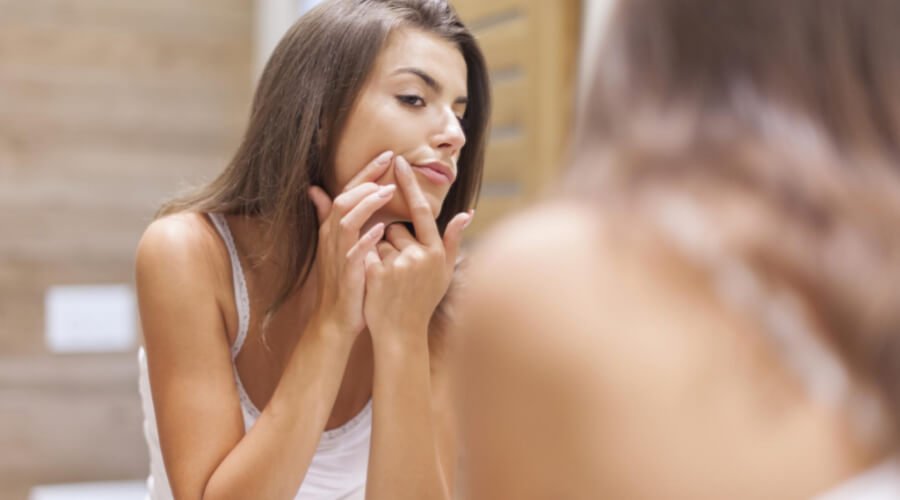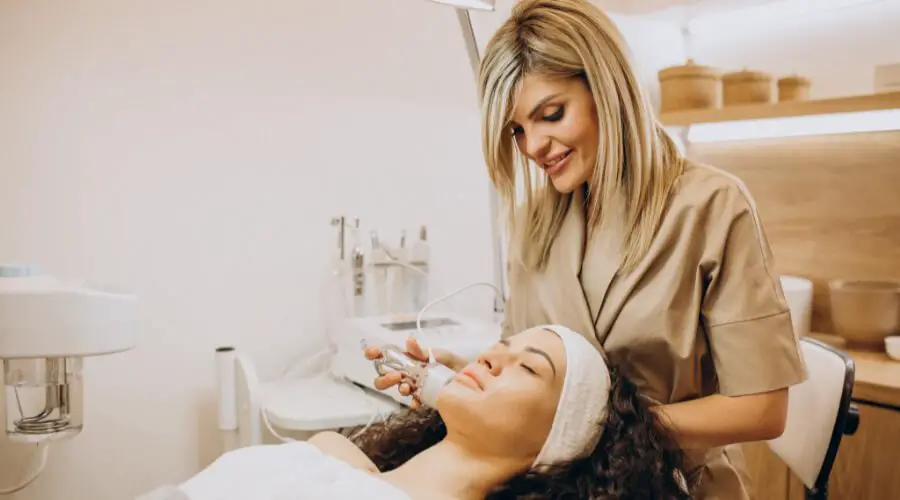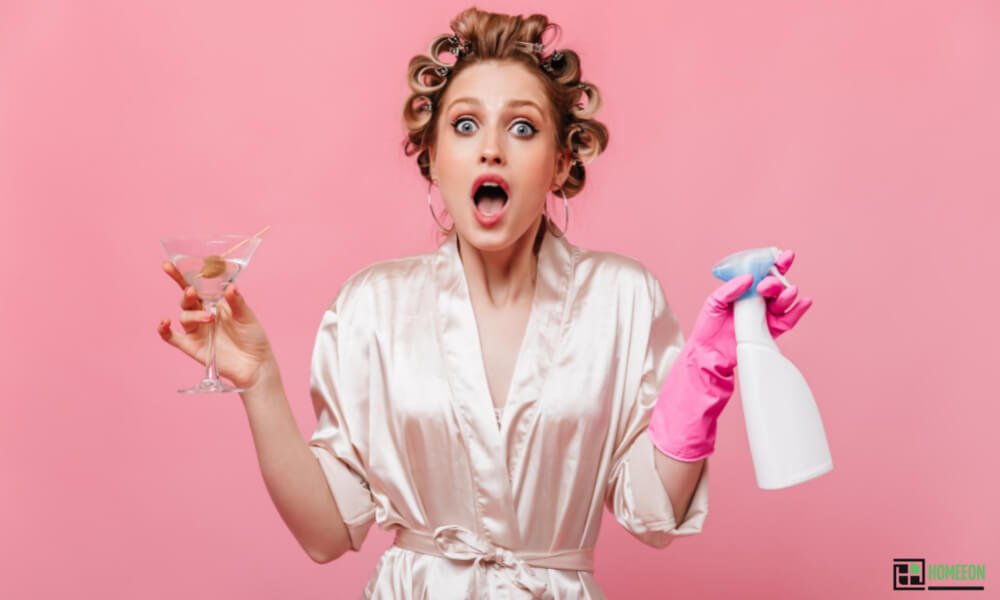Last Updated on July 22, 2023 By Emma W. Thomas
Using alcohol to clean your face is generally not recommended as it can be harsh and dry to the skin. While it may help remove some impurities, it can strip the skin of its natural oils, leading to irritation and dryness. Opt for milder, alcohol-free cleansers to maintain a healthier and balanced complexion.
Which Alcohols Are Safe for Cleaning Face?
Good Types of Alcohol for Cleaning Your Face:
| Alcohol Type | Benefits |
|---|---|
| Cetyl Alcohol | Acts as an emollient, keeping the skin moisturized and preventing dryness |
| Stearyl Alcohol | Effective at softening and soothing the skin |
| Cetearyl Alcohol | Functions as a thickening agent while offering moisturizing benefits |
| Benzyl Alcohol | Acts as a gentle preservative and antimicrobial agent |
Bad Types of Alcohol to Avoid for Facial Cleansing:
| Alcohol Type | Potential Risks |
|---|---|
| Denatured Alcohol | Can excessively dry out the skin, leading to irritation and disruption of the skin barrier |
| Isopropyl Alcohol | Harsh and drying, may cause irritation and damage to the skin |
| SD Alcohol | Highly drying and irritating, can strip the skin of its natural oils |
| Methanol or Methyl Alcohol | Toxic and can cause skin irritation and allergic reactions |
The Debate: Is Alcohol in Skin Care Good or Bad?
Alcohol in skin care products has long been a topic of debate among beauty enthusiasts and experts alike. Some argue that alcohol can be beneficial for certain skin types, while others believe it can be harmful and should be avoided. So, what’s the truth? Let’s dive into the debate and explore both sides of the argument.
The Pros of Alcohol in Skin Care:
- Antibacterial properties: Alcohol, particularly ethanol or isopropyl alcohol, has been used for its antibacterial properties in many skin care formulations. It can help disinfect the skin and prevent the growth of bacteria, which is crucial for acne-prone or oily skin types.
- Quick-drying texture: Alcohol is known for its fast-evaporating nature, which can contribute to a lightweight and non-greasy texture in skin care products. This is especially appreciated in serums, toners, and other products where a light and quick-drying formula is desired.
- Enhanced product absorption: Alcohol can act as a carrier agent, helping other beneficial ingredients penetrate the skin more effectively. By evaporating quickly, it can assist in the absorption of active ingredients, making them more efficient in delivering their intended benefits.
The Cons of Alcohol in Skin Care:
- Drying effect: Alcohol has a reputation for drying out the skin, stripping it of its natural oils. This can disrupt the skin’s moisture barrier and lead to dehydration, irritation, and even overproduction of oil as the skin tries to compensate for the moisture loss.
- Sensitizing potential: Some individuals may have a sensitivity or allergy to alcohol in skin care products. This can manifest as redness, itching, or skin irritation. Those with sensitive or dry skin types may find alcohol-based products more irritating and should exercise caution.
- Long-term damage: Continuous use of alcohol-based products can potentially disrupt the skin’s pH balance, leading to long-term damage. The skin’s protective barrier may weaken, making it more susceptible to environmental stressors and causing issues like increased sensitivity or premature aging.
Ultimately, whether alcohol in skin care is good or bad depends on various factors, including your individual skin type and sensitivity. It’s always recommended to consult with a dermatologist or skin care professional to understand what would work best for your specific needs.
Can You Use Alcohol To Clean Your Face?

Many people have read that they can use alcohol to clean their faces, especially those dealing with acne problems. The answer to this question is that alcohol is one of the many ways to deal with acne. Is it safe? It depends on your skin type. Some skins are highly sensitive and react to any new chemical introduced to them.
It is crucial to know the science behind alcohol and how it reacts to your face. Alcohol helps in fighting bacteria and other microbes. Some skin conditions such as acne and rashes are bacterial skin infections, and using alcohol can eliminate them. For associated bacterial infections, you can go for alcohol-based substances to clean your face. When you go for alcohol-based face cleaners, they must be used for the short term since using them for longer can cause adverse effects to your face skin.
The reason you should use alcohol-based face cleaners for a short time is that alcohol breaks down bacteria. It is non-selective, and it destroys all bacteria, including those playing important roles in your skin. Alcohol is known to have a high evaporation rate hence causing dryness to your skin.
The bottom line is, you can use alcohol to clean your face, provided it is short-term. Due to its high evaporation rate, alcohol serves as a good option to dry out pimples very fast, which helps in clearing clogged-up pores. It is highly applicable in whiteheads and blackheads treatment.
How Does Alcohol Affect Skin Cells When Used To Clean The Face?
It is wrong to assume that alcohol used in hospitals as injection prep is safe when used in beauty products. Alcohol used in the lab is usually 3% or less, whereas that used in beauty products is about 5% and can go as high as 60%. Such concentration is too much for facial skin to handle and can do more harm than good. High alcohol concentration destroys skin cells that offer defense against free radicals. Destroying these cells leads to inflammation.
Exposing your face to too much alcohol causes self-destruction of your facial skin cells. The longer the exposure, the more destruction of skin cells occurs, leaving itchy and dry skin, especially when a product has over 10% alcohol used. For this reason, whether using a highly concentrated or lowly concentrated alcohol-based product for your skin, avoid doing it for a long time to avoid exposing your skin and its protective bacteria to destruction.
Are There Safe Alcohols You Can Use To Clean Your Face?
Alcohol comes in different types and forms, and its effects depend on how you use it. Some alcohols are safe, whereas others are unsafe for your face. When buying beauty products with alcohol, avoid those with high content. Some products may not indicate their percentage.
You can use “red flags” to know whether it is good or bad. For instance, avoid products with alcohol as the main ingredient. Chances are, such products have high alcohol content than what your skin needs. Giving your skin a little bit of alcohol treatment is harmless. You can do this by investing in low-alcohol-based products.
There are safe and unsafe alcohols for your skin.
The good thing is that there are alcohols that are safe and healthy to use on your face. Alcohols considered safe for cleaning your face are fatty alcohols like cetyl and stearyl alcohol. For instance, you get cetyl alcohol from coconut and vegetable oil. Their fatty nature makes them skin-friendly by creating a thick, luxurious, protective barrier against external factors like the Ultra Violet rays.
Fats contained in these alcohols have emollient properties that help your facial skin bolster, hence offering defense by locking in moisture. It helps prevent your skin from drying up hence suitable for sensitive and dry skin. Fatty alcohols are safe and were ranked the best as they have not been associated with any health hazard, especially when skincare is concerned.
The unsafe alcohols are usually made from petroleum-based ingredients, making them simple and denatured. They are nothing close to what your bloodstream needs. They are unfriendly to your skin, and they act as preservatives. Some of these unsafe alcohols include isopropyl alcohol, ethanol, and alcohol denat. They serve as texture formulas, preservatives, and others serve as drying agents to help the liquid dry off your skin faster. Most of these alcohols are used in skin toning and cleansing products to reduce excess sebum from your skin.
Unsafe alcohols are associated with short-term positive effects. After that, they create a very harsh and unhealthy environment for your skin. They strip off the protective skin cover leaving it dry and itchy over time. The dryness and itchiness come from destroyed skins barriers, hence the inability to retain elasticity and moisture. It makes the skin susceptible to UV rays which bring about skin aging signs such as loss of elasticity and wrinkles.
Whether using safe or unsafe alcohol, it is important to always properly wash and rinse away the alcohol-based product from your skin. It helps avoid the alcohol from staying on your skin for too long, which can unknowingly lead to the destruction of cells.
Other Than Using Alcohol To Clean Your Face, How Can You Care For Your Facial Skin?

Before you get yourself to the point of considering alcohol as an alternative for your facial skincare, it is important to protect your skin first. People who go for it as an option are usually at a stage where their face has acne, pimples, or other conditions. Below are some ways you can use to protect your facial skin;
Always Moisturize
After taking a bath, you should not wait until your skin is all dry. Instead, moisturize as soon as possible before water evaporates from your skin. For example, you can grab your moisturizing cream the moment you step out of the water.
Avoid Frequent Picking On Your Face.
Many people are always after every blemish that appears on their faces. They are very fast to squeeze and scratch them, which is like asking for facial trouble. Attacking these blemishes causes bleeding and scarring. Some leave them open, creating room for bacterial infections. Instead of running after them, you should let the pimple take its course and run through all its phases. It is just a matter of a few days compared to the period you will need to heal infections and wounds caused due to breaking them down.
The best way to deal with such blemishes is by leaving them for your dermatologist, who has a better and safer way of popping them up.
Keep Your Skin Away From Harsh Products.
Some people go for cheap products offering an easy way out, which usually provide short-term solutions leaving them with lifelong skin-associated problems. People have fought skin cancer, among other skin infections, due to poor facial skin products. Dermatologists have warned people against rubbing alcohol on their faces as a way of controlling acne and pimples. They are ineffective, and they tend to leave your skin in a worse condition.
They open up your skin pores by destroying the natural facial skin-protecting barriers making it susceptible to bacterial infections. You can use water and soap to clean your face, and if you have acne issues, you can visit a dermatologist who can guide you on what to use. In this way, you can avoid over-the-counter products that may contain benzoyl peroxide and salicylic acid, which are harmful to your skin.
Be On The Lookout For Changes.
Dermatologists say that if you notice something different about your skin, you should seek medical advice as long as it makes you uncomfortable. Some skin cancer patients reported ignoring the first signs and symptoms such as moles presence and new unexplained skin growths. They may not be much at first, but they can lead to more serious and life-threatening effects if left unattended.
For instance, changes in skin pigmentation can be due to kidney and liver failure, whereas you are out there using alcohol-based products. Other diseases that affect the skin include diabetes and allergies.
Conclusion
It is safe to clean your face using alcohol, depending on the type you are using. There are safe and unsafe alcohols. Unsafe alcohols are made from petroleum products and usually provide short-term solutions. On the other hand, safe alcohols for facial skincare are fatty alcohols usually made from coconut and vegetable oils. They provide a protective cover on your skin to prevent elasticity loss and evaporation, preventing your skin from dryness.
References:
https://www.everydayhealth.com/smart-skin/alcohol-in-skin-care-is-it-ever-okay/
https://www.verywellhealth.com/does-rubbing-alcohol-clear-acne-15512
Emma is a graduate of Domestic Science or Family and Consumer Sciences (Home Economics) from the University of Wisconsin. She has 7 years of experience Working with the strategic section of BestBuy and now writing full-time for Homeeon.
From Managing the Home, Interiors, Cleaning, and Exteriors to Gardening and everything about Making A Home Liveable – is her passion and this Homeeon is the result of this.
Emma loves decorating her home with the best stuff found online. She cares about quality over anything and writes reviews about them here in Homeeon. Get in touch with her over Pinterest.
Keep reading her blogs.
